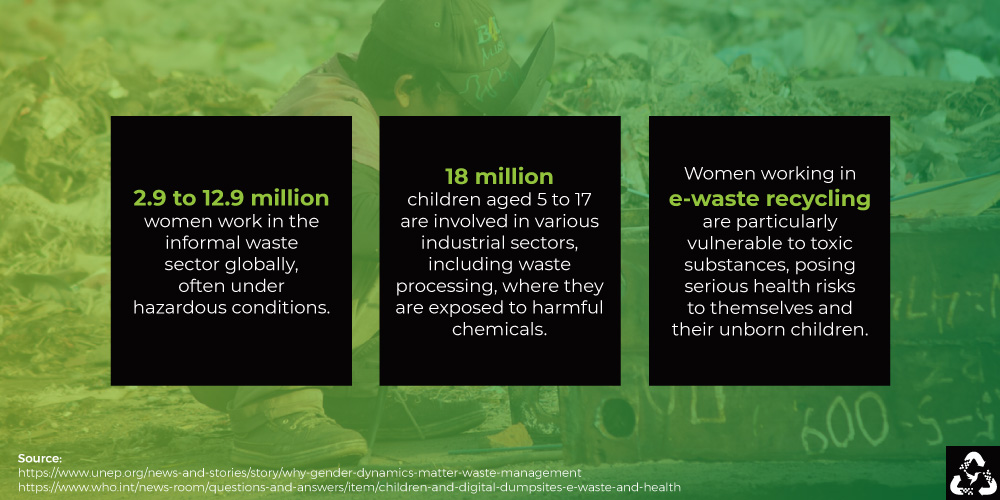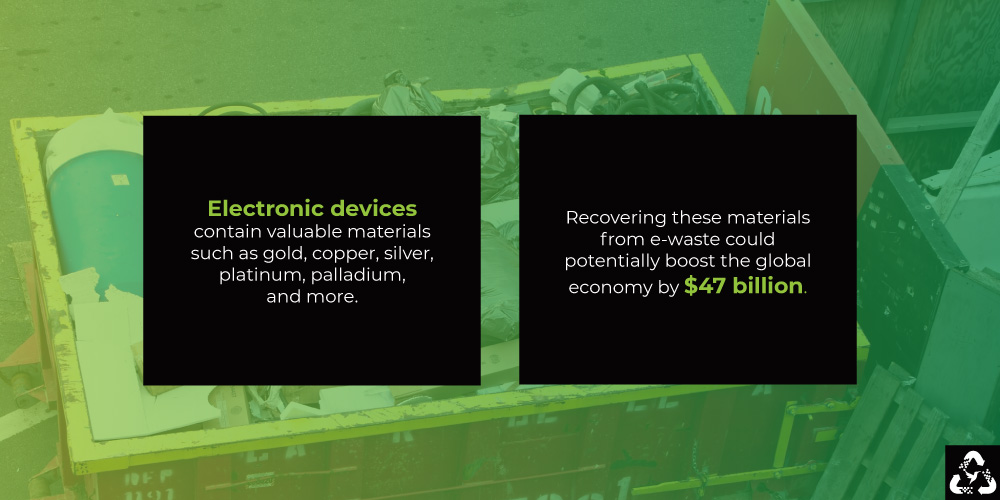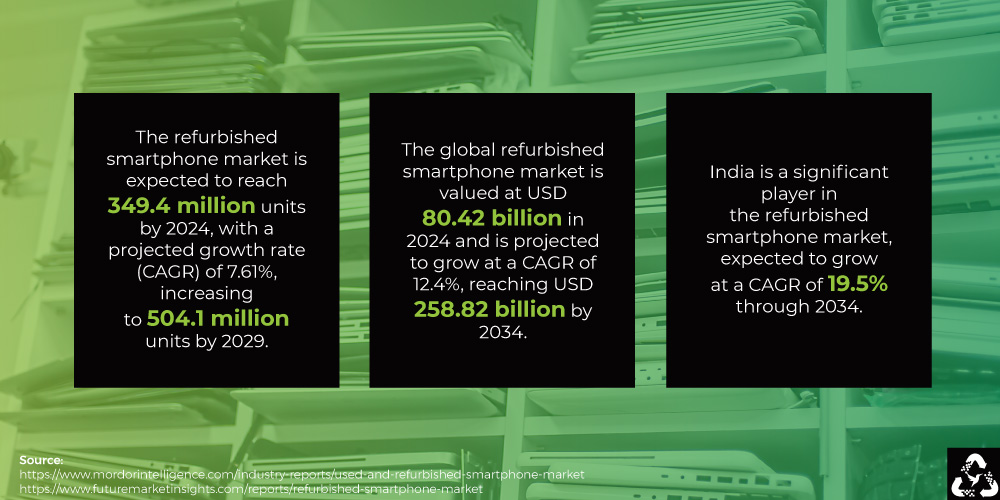The Upside of E-Waste: 6 Economic Benefits of E-Waste Recycling
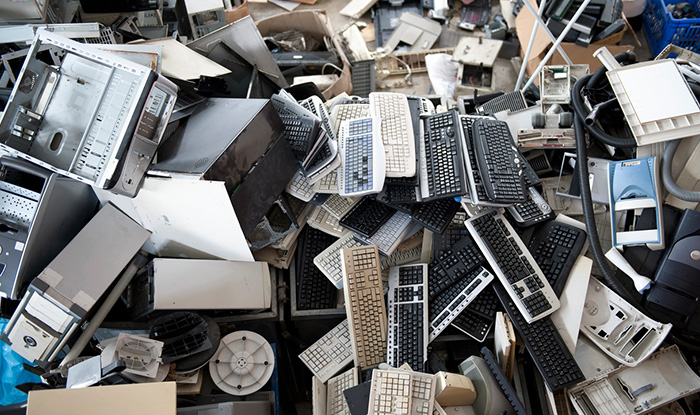
Photo Credit: iStockPhoto/baranozdemir
Recycling your e-waste is good for the environment, but how profitable is it for the economy? Let’s see.
As per a research report by Repowered, a recycling advocacy group in Minnesota, the economic potential of e-waste recycling is enormous in the state. If Minnesota alone started recycling 100% of its electronic waste (over 266 million pounds at the time of research), it would result in:
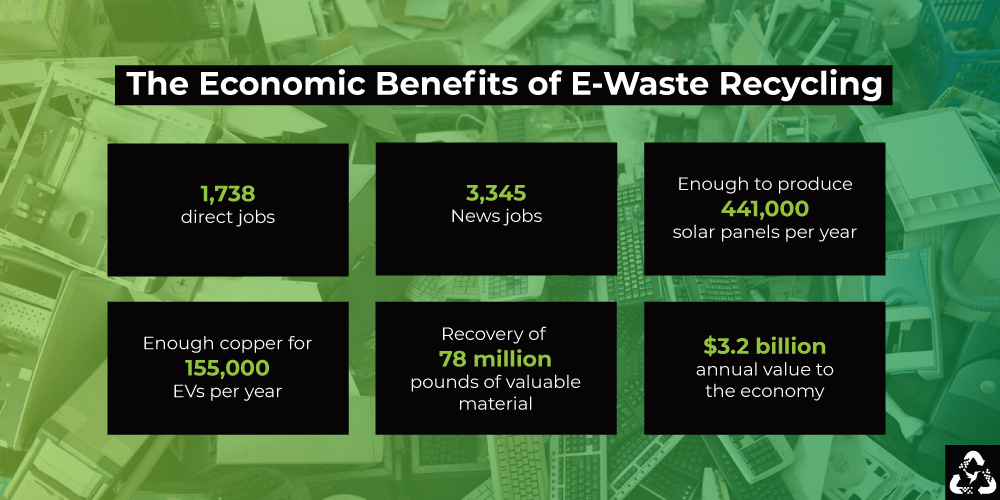
Research report data detailing economic benefits of e-recycling in Minnesota | Source: Repowered
- 1,738 direct jobs
- 3,345 new jobs
- Enough to produce 441,000 solar panels per year
- Enough copper for 155,000 EVs per year
- Recovery of 78 million pounds of valuable material
- $3.2 billion annual value to the economy
This data paints a very hopeful picture for the future of our planet where sustainable business is just good business.
6 Economic Benefits of E-Waste Recycling
Below, we share 6 practical ways e-waste helps us fill our economy’s coffers while also making us feel good about ourselves.
1. Job creation
E-waste recycling is directly tied to job creation. Hundreds of thousands of people are employed by the formal e-waste recycling sector across the world, but the informal sector is much larger.
Millions of men, women, and children work in the informal (and illegal + exploitative) recycling industry around the world. They take part in collecting e-waste, dismantling it, sorting it, refurbishing it, and recycling it.
These people (and children) work in harsh conditions, often with extremely low pay, and with no protective gear against the harms of working in such proximity to toxins of e-waste.
Proper recycling of e-waste can solve this crisis.
According to the International Labour Organization, a UN agency for the development of global workers, we throw away “50 million tonnes of potentially job-creating e-waste […] annually.”
If we standardize e-waste recycling around the globe and set up recycling centers and facilities where workers can be trained to handle e-waste professionally, it can create tons of jobs across the economy.
These jobs can include everything from logistics to recycling processes and refurbishing and reselling to research and development.
2. Resource recovery
We have always maintained that e-waste recycling is a giant opportunity we’re missing by not adopting it rigorously in our economies.
Our electronic devices are made of extremely valuable materials such as gold, copper, silver, platinum, palladium, and more. The material recovery of these items alone can give the global economy a boost of $47 billion!
Not to mention the human capital we’ll save (and the global admiration we’ll earn) by shunning virgin mining which exploits vulnerable communities and economies.
Resource recovery also boosts job creation in the sorting and dismantling sector and supports the circular economy by reintroducing those products back into manufacturing.
3. Revenue generation
Around the world, the need for affordable tech is increasing. As the world grapples with a multitude of economic, climate, and humanitarian crises, people are desperate to find solutions that align with their value system and are least impactful to nature.
Secondary electronic markets have emerged as a godsend answer.
These markets offer repaired and refurbished tech items at extremely affordable prices. The items are repaired with available resources without any need to mine for more materials. Plus, the inherent affordability of these items means that people on the other side of the digital divide can now also access good tech at costs they can manage.
Again, these revenue-generating streams of secondary markets also employ a large workforce of talented and trained tech repair professionals, who not only perfect their craft but also make it a craft of knowledge for others joining the industry.
4. Increased affordability
Talking about affordable tech, it’s important to mention that while the change has been pioneered through the expansion of secondary electronic markets, it’s hardly the only factor at play.
Recycled materials sourced from e-waste also result in making tech more affordable. Using recycled copper, silver, gold, etc. is much more cost-efficient than mining these from the source. It also results in the reduction of carbon footprint because you don’t have to lug around huge shipments of valuable materials from one part of the world to another.
In addition to all these economic benefits, affordable tech also improves tech access to wider communities, eroding generational poverty and uplifting underprivileged communities in several diverse ways.
5. Promotion of green technologies
Practicing sustainability breeds sustainability.
Eco-friendly businesses that operate within the framework of a sustainable economy set in motion a chain reaction. They expose other people to the benefits of it, the how-to of it, and the great business sense of it. They also inspire other business leaders to understand sustainability more practically, demonstrating how it interacts with and impacts the real world. This helps everyone explore ways in which they can adopt it so it meets their unique needs and goals.
The promotion of green technologies also drives innovation in the industry, as we’re witnessing in real-time. Companies are trying to outdo each other to come up with the latest sustainable tech solution that will answer all problems.
Tesla is a glowing example where it popularized the concept of EVs to a point that all mainstream car manufacturers are now in a bid to release their EVs with all the latest features, strappings, and eco-friendly powerpoints.
6. Circular economy
If you’ve been paying attention, you’ll notice a familiar pattern emerging.
Every benefit of e-waste recycling connects with the other and supports a circular web of economy. In this web, everything directly affects the other and when one blossoms, all take heart and bloom. Similarly, a web design company in Charlotte can create interconnected digital solutions that enhance each aspect of your online presence, leading to overall growth and success.
Revenue generation supports secondary electronics, which support workers trained in tech repair, which enables affordable tech, which reduces generational poverty, and enables more people to buy tech products, and so on.
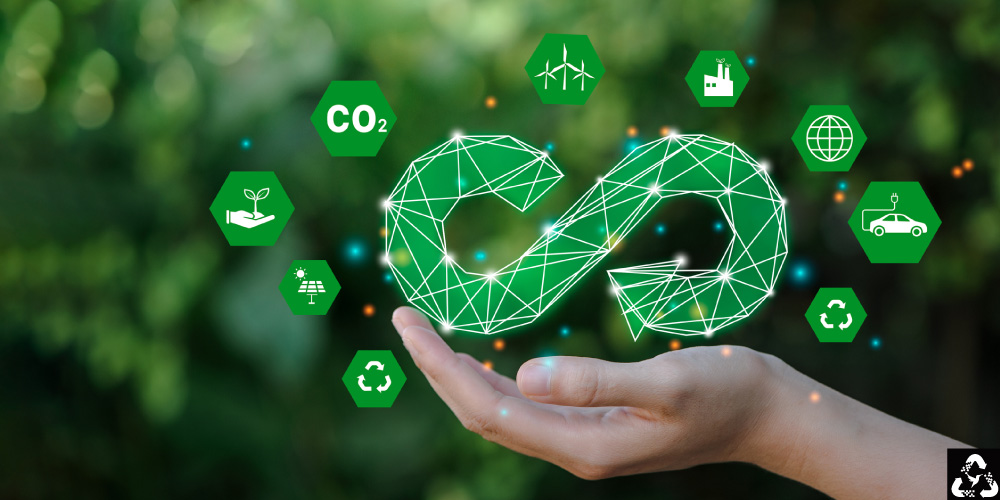
Image Source: iStock/Khanchit Khirisutchalual
This chain reaction has a name and it’s called circular economy.
It’s an economic model that values the reduction of waste by preventing excess buying and consumption. This all-embracing model takes into account every step of the value chain and finds ways to improve it. By making e-waste recycling a core component of eco-friendly businesses, we directly take part in the promotion of a circular economy and create a sustainable business world.
Conclusion
Electronic recycling has always been a great action point for climate activists. It’s good for natural resources, helps local communities, and prevents a whole host of health issues related to e-waste toxicity.
But e-waste recycling is a great thing for the economy too. It makes good business! It supports a ton of job creation activities in several sectors of the economy; brings lost valuables back into circulation to make new products; reduces the cost of manufacturing new electronics; and supports every phase of the circular economy by being a wholesome, grass-roots solution.
If you’ve been looking for a sign to make your business eco-friendly, use this post as one. In addition to the few benefits we’ve listed here, there are tons more upsides to electronics recycling. So become a part of the solution, and erase the problem every time you recycle your discarded old tech.
About The Author Kelly Sampson
Kelly Sampson is a writer, blogger, and environmental enthusiast. She has strong opinions about climate change, the dogs vs. cats debate, and Oxford commas. She has lent Hummingbird International her engaging and spirited voice and turned our blog into a great place to find valuable information about e-waste, e-waste recycling, and the ITAD industry. Explore our blog to read more of her work.

